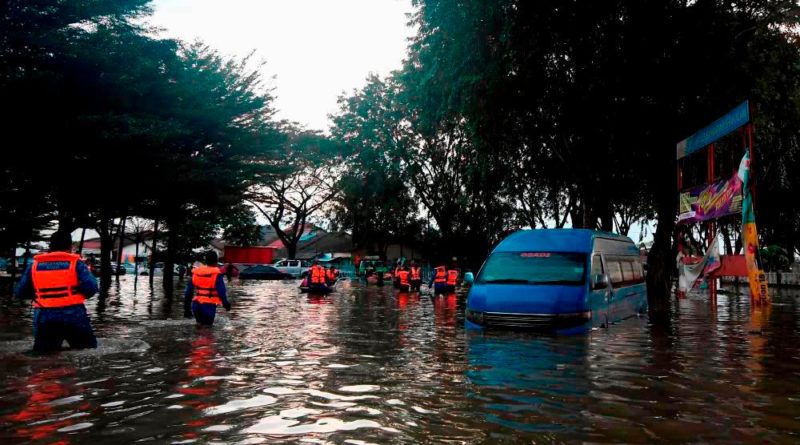OP ED: OPINION: A call to action for climate change
.
Mogesh Sababathy

THIS year’s Aidilfitri celebration has been particularly challenging due to the scorching heat waves that coincided with the festive season.
As Malaysians gathered to celebrate and exchange warm wishes, they also had to endure the sweltering heat and discomfort caused by the rising temperatures.
Just a few months ago, the nation was grappling with widespread floods and now the focus has shifted to battling the heat.
It becomes increasingly clear that the urgency to address the climate crisis cannot be ignored.
In fact, the impact of these heat waves extends far beyond the discomfort we experience in our daily lives.
According to Unicef (United Nations Children’s Fund), a staggering statistic reveals that by 2050, nearly every child on our planet, about 2.2 billion children, will be exposed to high heatwave frequency, a significant increase from the 24% of children affected in 2020.
Presently, about 559 million children already endure such conditions, with an additional 624 million more facing other heat-related challenges such as prolonged heatwave durations, heightened heatwave severity or even extremely high temperatures.
These alarming numbers paint a bleak future for our youths, underscoring the necessity for immediate and comprehensive action.
As World Environment Day approaches on June 5, it is important to take stock of where we stand as a planet and as Malaysians.
According to the Change for Climate (2020) report by the United Nations Development Programme, Unicef and supported by EcoKnights, 92% of young Malaysians are aware of environmental issues and recognise the climate crisis.
However, as a young person myself, I can’t help but feel a sense of frustration when it comes to our collective response to the climate crisis.
We all know that the planet is in trouble but it sometimes seems like we are not taking the problem seriously enough.
But let’s be real, we cannot all be Greta Thunberg.
All of us can’t be marching in the streets and delivering fiery speeches that go viral. But that does not mean we cannot do something.
In fact, there are many practical ways that we can all contribute to the fight against climate change.
Firstly, we need to be mindful of our daily consumption habits.
We can all start by reducing our use of plastic waste.
This means carrying a reusable bag, water bottle and straw with us wherever we go.
We can also be mindful of the packaging that our food comes in and try to choose products with minimal packaging.
By reducing our plastic waste, we are not only helping the environment but we are also sending a message to manufacturers that we demand more sustainable products.
Secondly, we need to think about our transport choices.
Carpooling, cycling or walking can all be great alternatives compared with driving alone.
Not only does this help reduce carbon emissions but it can also save us money on fuel and parking fees.
Thirdly, we need to be more conscious of our energy usage.
Turning off lights and appliances when we are not using them can go a long way in reducing our carbon footprint.
We can also switch to energy-efficient light bulbs and appliances to help reduce our energy consumption.
Fourthly, we need to be mindful of the food we eat.
Eating more plant-based meals and reducing our meat consumption can significantly reduce our carbon footprint.
We can also try to choose locally sourced and organic food, which has a lower impact on the environment.
Lastly, we can all get involved in local environmental initiatives.
This could mean volunteering with an environmental organisation, participating in a community clean-up or simply spreading awareness about the importance of taking care of our planet.
We can also support businesses and brands that prioritise sustainability and environmental responsibility.
But it is not enough for individuals to make these changes alone.
We need action from our government and corporations to make real progress in the fight against climate change.
It is commendable to hear that the government is taking steps to reduce plastic waste by aiming to ban plastic bags for retail purposes by 2025.
However, it is important to recognise that public awareness and education are critical in making this policy a success.
If the pressure to reduce plastic waste only comes from the government, it may not be enough to create real change.
It is crucial that the government works in collaboration with businesses and individuals to provide alternative solutions to plastic bags.
Encouraging the use of reusable bags, for example, is an excellent alternative to single-use plastic bags.
The government can also promote the use of biodegradable and compostable bags as an option to reduce plastic waste.
Furthermore, it is important to recognise the relevance of this action in the larger context of the climate crisis.
While reducing plastic waste is crucial, it is not the only solution to the environmental challenges we face.
We need to address the root causes of the climate crisis such as the burning of fossil fuels and deforestation.
It is essential to push for systemic change and demand action from our government and corporations to protect our planet.
It is also worth taking a critical look at one of the most common environmentally friendly actions that we have been taught since we were in school: recycling. While recycling is certainly better than throwing everything away, it is worth considering whether it is still the best option.
For one, not everything can be recycled and contamination can make it even more difficult to recycle.
Additionally, recycling often requires a lot of energy and resources to process and transport materials, which can have its own environmental impact.
While recycling is important, it should not be the only solution we rely on.
It is essential to reduce the amount of waste we produce, such as by reducing our plastic consumption, choosing products with minimal packaging and repairing items instead of throwing them away.
By focusing on reducing our waste, we can minimise the need for recycling in the first place.
In conclusion, World Environment Day serves as a vibrant call to action, inviting all of us, especially young people, to join hands in safeguarding our precious planet.
As Malaysians, we have the power to create a meaningful impact through practical actions that reduce our environmental footprint.
Let us be the catalysts for change, raising our voices and advocating for systemic transformations that prioritise sustainability.
By actively engaging with our government and corporations, we can foster a collaborative approach towards building a brighter, greener future for ourselves and future generations.
Together, let us champion environmental stewardship, nurturing a world where harmony between humanity and nature thrives.
EDITOR IN CHIEF
 Ads by: Memento Maxima Digital Marketing
Ads by: Memento Maxima Digital Marketing
@[email protected]
SPACE RESERVE FOR ADVERTISTMENT
.
Mogesh Sababathy is a youth climate champions consultant at Unicef Malaysia, co-founder of Project Ocean Hope and PhD Candidate at Universiti Putra Malaysia. Comments: [email protected]


 Memento Maxima Digital Marketing
Memento Maxima Digital Marketing







